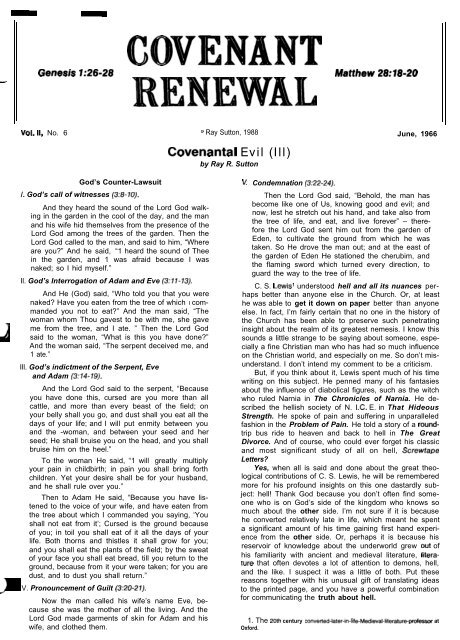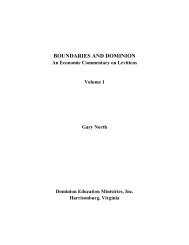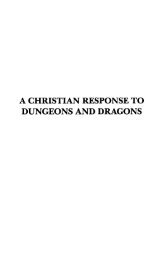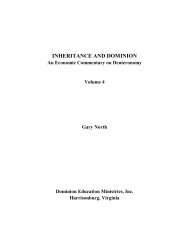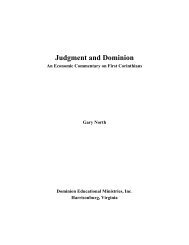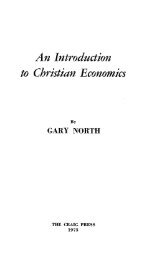Covenant Renewal - Gary North
Covenant Renewal - Gary North
Covenant Renewal - Gary North
Create successful ePaper yourself
Turn your PDF publications into a flip-book with our unique Google optimized e-Paper software.
e<br />
Genesis 1:26-28<br />
Vol. 11, No. 6<br />
COVENANT<br />
RENEWAL<br />
o Ray Sutton, 1988<br />
Mafthew 28:18-20<br />
June, 1966<br />
<strong>Covenant</strong>al Evil (Ill)<br />
by Ray R. Sutton<br />
J<br />
God’s Counter-Lawsuit<br />
/. God’s call of witnesses (3:8-10).<br />
And they heard the sound of the Lord God walking<br />
in the garden in the cool of the day, and the man<br />
and his wife hid themselves from the presence of the<br />
Lord God among the trees of the garden. Then the<br />
Lord God called to the man, and said to him, “Where<br />
are you” And he said, “1 heard the sound of Thee<br />
in the garden, and 1 was afraid because I was<br />
naked; so I hid myself.”<br />
Il. God’s Interrogation of Adam and Eve (3:11-13).<br />
And He (God) said, “Who told you that you were<br />
naked Have you eaten from the tree of which I commanded<br />
you not to eat” And the man said, “The<br />
woman whom Thou gavest to be with me, she gave<br />
me from the tree, and I ate. ” Then the Lord God<br />
said to the woman, “What is this you have done”<br />
And the woman said, “The serpent deceived me, and<br />
1 ate.”<br />
Ill. God’s indictment of the Serpent, Eve<br />
and Adam (3:14-19).<br />
And the Lord God said to the serpent, “Because<br />
you have done this, cursed are you more than all<br />
cattle, and more than every beast of the field; on<br />
your belly shall you go, and dust shall you eat all the<br />
days of your life; and I will put enmity between you<br />
and the -woman, and between your seed and her<br />
seed; He shall bruise you on the head, and you shall<br />
bruise him on the heel.”<br />
To the woman He said, “1 will greatly multiply<br />
your pain in childbirth; in pain you shall bring forth<br />
children. Yet your desire shall be for your husband,<br />
and he shall rule over you.”<br />
Then to Adam He said, “Because you have listened<br />
to the voice of your wife, and have eaten from<br />
the tree about which I commanded you saying, ‘You<br />
shall not eat from it’; Cursed is the ground because<br />
of you; in toil you shall eat of it all the days of your<br />
life. Both thorns and thistles it shall grow for you;<br />
and you shall eat the plants of the field; by the sweat<br />
of your face you shall eat bread, till you return to the<br />
ground, because from it your were taken; for you are<br />
dust, and to dust you shall return.”<br />
mV. Pronouncement of Guilt (3:20-21).<br />
/<br />
Now the man called his wife’s name Eve, because<br />
she was the mother of all the living. And the<br />
Lord God made garments of skin for Adam and his<br />
wife, and clothed them.<br />
v, Condemnation (3:22-24).<br />
Then the Lord God said, “Behold, the man has<br />
become like one of Us, knowing good and evil; and<br />
now, lest he stretch out his hand, and take also from<br />
the tree of life, and eat, and live forever” – therefore<br />
the Lord God sent him out from the garden of<br />
Eden, to cultivate the ground from which he was<br />
taken. So He drove the man out; and at the east of<br />
the garden of Eden He stationed the cherubim, and<br />
the flaming sword which turned every direction, to<br />
guard the way to the tree of life.<br />
C. S. Lewisl understood hell and all its nuances perhaps<br />
better than anyone else in the Church. Or, at least<br />
he was able to get it down on paper better than anyone<br />
else. In fact, I’m fairly certain that no one in the history of<br />
the Church has been able to preserve such penetrating<br />
insight about the realm of its greatest nemesis. I know this<br />
sounds a little strange to be saying about someone, especially<br />
a fine Christian man who has had so much influence<br />
on the Christian world, and especially on me. So don’t misunderstand.<br />
I don’t intend my comment to be a criticism.<br />
But, if you think about it, Lewis spent much of his time<br />
writing on this subject. He penned many of his fantasies<br />
about the influence of diabolical figures, such as the witch<br />
who ruled Narnia in The Chronicles of Narnia. He described<br />
the hellish society of N. I.C. E. in That Hideous<br />
Strength. He spoke of pain and suffering in unparalleled<br />
fashion in the Problem of Pain. He told a story of a roundtrip<br />
bus ride to heaven and back to hell in The Great<br />
Divorce. And of course, who could ever forget his classic<br />
and most significant study of all on hell, Screwtape<br />
Letters<br />
Yes, when all is said and done about the great theological<br />
contributions of C. S. Lewis, he will be remembered<br />
more for his profound insights on this one dastardly subject:<br />
hell! Thank God because you don’t often find someone<br />
who is on God’s side of the kingdom who knows so<br />
much about the other side. I’m not sure if it is because<br />
he converted relatively late in life, which meant he spent<br />
a significant amount of his time gaining first hand experience<br />
from the other side. Or, perhaps it is because his<br />
reservoir of knowledge about the underworld grew out of<br />
his familiarity with ancient and medieval literature, literature<br />
that often devotes a lot of attention to demons, hell,<br />
and the like. I suspect it was a little of both. Put these<br />
reasons together with his unusual gift of translating ideas<br />
to the printed page, and you have a powerful combination<br />
for communicating the truth about hell.<br />
1. The 20th century converted-later-in-life-Medieval-literature-profeesor at<br />
Oxford.
COVENANT RENEWAL -2<br />
One of his most remarkable comments (via Screwtape)<br />
on the subject is found at the end of Screwtape Letters.<br />
The scene is in Hell at the annual dinner of the Tempter’s<br />
Training College for young devils. The principal, Dr.<br />
Slubgob, has just proposed the health of the guests.<br />
Screwtape, a very experienced devil, who is the guest of<br />
honor rises to reply. After a very lengthy address, he says<br />
in the second to the last paragraph, “The fine flower of<br />
unholiness can grow only in the close neighborhood of the<br />
Holy. Nowhere do we tempt so successfully as on the<br />
very steps of the altar.”z<br />
Much could be said about this one, easily-missed statement<br />
at the very end of the book: one of those places the<br />
eye quickly skips. I’ll only make one observation, however,<br />
since it brings us to the final study of covenantal evil. I<br />
believe that Lewis understood that the greatest attack on<br />
the kingdom of God comes nearest the throne. Why The<br />
most potent enemies of the Church are always its former<br />
members.<br />
The Inside Man<br />
Dr. <strong>Gary</strong> <strong>North</strong> has developed this point in a chapter<br />
called, “The Inside Man.”3 He discusses in Dominion and<br />
Common Grace the concept of common grace, particularly,<br />
Cornelius Van Til’s concept of common grace.4 Van<br />
Til argues that common grace is restraint on the unbeliever’s<br />
self-consciousness. As history progresses, God<br />
lifts the restraints that the unbeliever becomes more<br />
and more antagonistic to the things of God. So far so good.<br />
But according to Van Til, the unbeliever becomes more<br />
and more formidable in his attacks because he knows<br />
more. He even becomes so successful that the Church<br />
must be removed from history, so that it can be saved and<br />
the final Judgment Day can begin. Ah yes, rapture fever<br />
has tended to run high even in some reformed circles!<br />
Dr. <strong>North</strong> criticizes Van Til in Dominion and Common<br />
Grace on several points. Most of all, he differs with Van<br />
TII’s notion that common grace disappears in history.<br />
Consequently, neither does Dr. <strong>North</strong> believe in the defeat<br />
of the Church in time, space and history. Why<br />
He disagrees with Van Til’s whole definition of common<br />
grace, which in his opinion is rationalistic. In other<br />
words, he points out that Van Til said common grace is<br />
in terms of lack of knowledge, so that increased knowledge<br />
on the part of the unbeliever brings about the demise<br />
of Christianity on earth. Yet, <strong>North</strong> cites that Van Til spent<br />
his whole life fighting the Greek rationalistic – God is pure<br />
logic – view of the world. Instead, he taught his students<br />
to think in covenantal categories – covenant-keeper, covenant-breaker<br />
– as opposed to rationalistic (Aristotelian<br />
logic) ones, and certainly not irrationalistic (mystical) ones.<br />
<strong>North</strong> presses for a consistent covenantal interpretation<br />
of common grace, such as: the benefits of the covenant<br />
that come to the unbeliever because he lives in<br />
the proximity of the covenant. In this sense, self-consciousness,<br />
or knowledge, is a benefit. But <strong>North</strong> maintains<br />
that the unbeliever reacts to Christianity not because<br />
of knowledge but covenant; as has been often said,<br />
“Man’s problem is moral not intellectual.” <strong>North</strong> also more<br />
importantly says that common grace increases because<br />
special grace increases.s It is best summed up in the<br />
words of Jeremiah, quoted by Paul in Hebrews:<br />
2. Lewis, York: Macmillan Company, [1961]<br />
1966), p. 172. Emphasis mine,<br />
3. G 1 ary <strong>North</strong>, Dominion (Tyler, Texas: Institute<br />
for Christian Economics, 1987), pp. 218-235.<br />
4. Van Til was professor of Apologetics at Westminster Theological Seminary<br />
(East).<br />
5. <strong>North</strong>, p. 94,<br />
For this is the covenant that I will make with the<br />
house of Israel after those days, says the Lord: I will<br />
put My laws into their minds, and I will write them<br />
upon their hearts. And I will be their God, and they<br />
shall be My people. And they shall teach everyone<br />
his fellow citizen, and everyone his brother, saying<br />
“Know the Lord,” for all shall know Me, from the least -<br />
to the greatest of them (Hebrews 8:9-11).<br />
Notice how special knowledge of the Lord expands,<br />
meaning general knowledge will also increase. Yes, the unbeliever<br />
becomes more self conscious. Yes, he knows<br />
more about the covenant and the things of God. Yes, he<br />
converts in greater number. And yes, there is a great unsuccessful<br />
uprising against the Church at the end of history<br />
(Revelation 20).<br />
Attack from WRhin<br />
But the critical question to this whole discussion is,<br />
“Where exactly does the attack come from” <strong>North</strong> says,<br />
This raises a major problem: Where does the reprobate<br />
learn more about the hated ethical system of<br />
Christianity, so that he can rebel against it more effectively<br />
by borrowing from itG<br />
He answers the question with a discussion about the<br />
“inside man,” the apostate, former member of the Church.<br />
Technically speaking, he is not an unbeliever, because an<br />
apostate is not “just” an unbeliever. He is someone who<br />
has been “near the throne of God,” covenantally committed,<br />
who rejected the Lord, and who has been cast out.<br />
No doubt he was never a “true” believer, but he was “covenantally”<br />
a believer. He was cast out of the covenant.<br />
The best example of this process is Satan himself. He<br />
was the highest of all creation, nearer the throne of God<br />
than any other being. He apostatized and was excommunicated<br />
to his utter defeat. And, as <strong>North</strong> points out, the process<br />
goes on all through history. The apostates supply the -<br />
antagonists with members to oppose the Church: Cain,<br />
Ham, Esau, Judas, and so on and so on.T<br />
In each case, however, knowledge is not the issue. It<br />
is covenant, specifically covenant breaking. Yes, the apostate<br />
knows more but not because the restraint of common<br />
grace has been removed. Rather, the restraint of special<br />
grace has been taken away. Having had knowledge of special<br />
grace, the apostate is more potentially dangerous to<br />
the spiritual health of the church than anyone else. Again,<br />
it is covenantal knowledge. Listen to how much Paul says<br />
a person can know and experience in the covenant, and<br />
yet, still fall away.<br />
For in the case of those who have once been<br />
enlightened and have tasted of the heavenly gift and<br />
have been made partakers of the Holy Spirit, and<br />
have tasted the good word of God and powers of the<br />
age to come, and then have fallen away, it is impossible<br />
to renew them again to repentance, since they<br />
again crucify to themselves the Son of God, and put<br />
Him to open shame (Hebrews 6:4-6).<br />
Not only is the Bible full of examples of people who<br />
had such knowledge, <strong>North</strong> even shows that this phenomenon<br />
of apostasy has haunted the Church in recent centuries.<br />
Men such as Jean-Jacques Rousseau began his academic<br />
career studying for the priesthood at a Roman Catholic<br />
seminary.<br />
Adam Weishaupt, founder of May Day, 1776, of the<br />
revolutionary conspiratorial group, the Illuminate, was at the _<br />
time professor of canon law at the University of Ingolstadt<br />
6.<br />
DD. 220-222.
in Bavaria. May Day of course is the traditional celebration<br />
day of ancient chaos religion, when children march around<br />
the phallic May pole. It is also the chief day of celebration<br />
for the Soviet Union, the day they parade their tanks and<br />
missiles in front of the Politbur~”s reviewing stand.8<br />
Maximilian Robespierre, the “voice of virtue” who beheaded<br />
so many during the reign of terror in 1794, had<br />
been a prize-winning graduate of the local church school<br />
in Arras, France.<br />
Finally, Karl Marx and Frederick Engels had both been<br />
fervent Christians in their teens. And so on and so on we<br />
could go all through history.<br />
<strong>North</strong> precisely observes, however, that it is not the removal<br />
of restraint on the unbeliever’s self consciousness<br />
that causes trouble for the Church. It is not the unbeliever<br />
at all. Rather, it is the covenant-breaking-apostasy of the<br />
former professing believer, the “inside man,” that results<br />
in the worst and final-yet-unsuccessful attacks on the<br />
Church. Satan is the first case in point. Why was his attack<br />
and why have all subsequent attacks been unsuccessful<br />
The answer lies in the covenant lawsuit mechanism,<br />
which brings us to the last part of Genesis 3.<br />
God’s <strong>Covenant</strong>al Lawsuit<br />
In “<strong>Covenant</strong>al Evil 11” I noted the work of Julien Harvey<br />
in the area of covenant Iawsuit.g I said that he had<br />
refined my understanding of this covenantal process: he<br />
sees a five-fold structure to the covenant, and develops<br />
aspects of the structure that help whole sections of Scripture<br />
to become clear. He does not comment about Genesis<br />
3, but his work can be easily applied. As I mentioned<br />
in the last newsletter, Satan used a covenantal approach<br />
to tempt Adam and Eve, making the Fall of man a covenant<br />
event. After the first sin, God goes through His own<br />
covenantal lawsuit. Meredith Kline says,<br />
God had brought Satan to the judgment tree to<br />
be damned. To man had been assigned the awesome<br />
role of standing as God’s viceregent at the<br />
place of judgment and consigning the great adversary<br />
to perdition, so sharing with Michael and his angels<br />
in the cleansing of the heavenly temple by casting<br />
Satan out [cf. Rev. 12:7ff.]. Man, however, had<br />
utterly failed in his messianic mission. He had declared<br />
good to be evil and evil to be good. He had<br />
broken his covenant with God and made league with<br />
the devil. The Lord God therefore came to the<br />
place of judgment in Eden to enter into a covenant<br />
lawsuit wRh~s offending vassals.lo<br />
So, God brought covenantal lawsuit. Harvey’s structure<br />
of the covenantal lawsuit explains the organization of God’s<br />
activity. I will not go through the discussion again but the<br />
Scripture at the beginning of this newsletter is organized<br />
according to Harvey’s five-fold model. Satan had actually<br />
gone through his own covenant lawsuit against God in the<br />
first parl of Genesis 3, because he followed a covenantal<br />
method of temptation. In the last half of the chapter, God<br />
begins His own counter-lawsuit.<br />
1. God’s call of witnesses (3:8-10).<br />
The Biblical covenant always begins with a declaration<br />
of God’s transcendence, His distinctness, and a statement<br />
of His immanence, nearness. The translation above, however,<br />
leaves much to be desired. it says, “They heard the<br />
sound of the Lord God walking in the garden in the cool<br />
8.<br />
Julien Harvey,<br />
(Montreal: Les Editions Bellarmin, 1967).<br />
10. Meredith G. Kline, Vol. I (Copyright Meredith Kline,<br />
1981 ), pp. 178-179. Emphasis mine,<br />
CovEwwr ~-s<br />
of the day.” It sounds as though god were having a casual<br />
stroll along Edenic Lane. Meredith Kline clarifies what<br />
the Hebrew text really says. He translates “cool of the day”<br />
as “Spirit of the day,” referring to the cloud of glory created<br />
by the Spirit of God, e.g. the same cloud that lead<br />
Israel by day and appeared as fire by night.<br />
‘Spirit” here denotes the theophanic glory, as it<br />
does in Genesis 1:2 and elsewhere in Scripture. And<br />
“the day” has the connotation it often has in the prophets’<br />
forecasts of the great coming judgment. Here in<br />
Genesis 3:8 is the original day of the Lord, which<br />
served as the prototypal mold in which subsequent<br />
pictures of other days of the Lord were cast. Such<br />
a day is one of divine epiphany. The final such day<br />
is preeminently the day of our Lord’s parousia, the<br />
day of his presence as the personal revelation of the<br />
Glory with the clouds and angels of heaven. . . . and<br />
accordingly, what is depicted there is nothing less<br />
than the primal parousia. On the original day of the<br />
Lord in Eden, God’s parousia-advent was in the theophanic<br />
mode of “the Spirit (Presence) of the day<br />
@f judgment).”11<br />
This interpretation of “cool of the day” sets up a covenantal<br />
understanding of the entire passage. The glorycloud<br />
often appears whenever a covenant is made (Sinai,<br />
Pentecost, etc.); it is one of the key covenant-cutting indicators.<br />
It establishes God’s transcendence and immanence.<br />
But in the context of Genesis 3, it also adds the judgmental<br />
dimension. God calls Adam and Eve to come to<br />
Him, “Where are you” In lawsuit language, He summoned<br />
them to appear as witnesses on His behalf. As Kline indicates<br />
above, they were to be witnesses against Satan. The<br />
devil was there at the judgment tree to be judged. He did<br />
not just happen to be there. He was there at God’s bidding<br />
and permission (Job 1 :6-8). As Biblical witnesses, Adam<br />
and Eve were to pass judgment and literally put him to<br />
death.<br />
A witness was to carry out God’s judgment: “The hand<br />
of the witnesses shall be first against him to put him to<br />
death, and afterward the hand of all the people” (Deuteronomy<br />
17:6-7). Dr. R. J. Rushdoony has made an interesting<br />
observation about the role of the witness. He says,<br />
The meaning of “witness” has been confused,<br />
however, because of a post-Biblical development of<br />
the Greek word for witness. The Hebrew word for<br />
witness, ed, edah, is_ given. in the .Greek New Testament<br />
as martus, marturion. the Greek word is the<br />
proper translation for the Old Testament word, as Matthew<br />
18:16, Mark 14:63, and many other passages<br />
make clear. But the Greek word martus is the origin<br />
of the English word “martyr,” and the result is an<br />
amazing confusion. The witnesses to Christ were executed<br />
by the Roman Empire, and the result was a<br />
strange reversal of meaning. In the Bible, the witness<br />
is one who works to enforce the law and assist<br />
in its execution, even to the enforcement of the death<br />
penalty. “Martyr” has now come to mean the exact<br />
reverse, i.e., one who is executed rather than an executioner,<br />
one who is persecuted rather than one who<br />
is central to prosecution.12<br />
Instead, Adam and Eve bore false witness, which<br />
meant that not only did they not execute Satan, but it<br />
11. Kline, pp. 180-181. For a much fuller treatment<br />
of the<br />
concept, see Kline’s book on the subject,<br />
(Grand Rapids: Baker, 1980).<br />
12. R. J. Rushdoony, (Nutley, New Jersey: Crag<br />
Press, 1973), p. 573.
COVENANT RENEWAL 4<br />
meant that they received the penalty that had been intended<br />
for God, since they entered into a conspiracy to<br />
destroy God and His covenant. A false witness according<br />
to Biblical law was to receive the penalty intended for the<br />
accused (Deuteronomy 19:16-21 ).<br />
So God’s actions toward Adam and Eve were covenantal.<br />
His transcendence and immanence were made<br />
known, indicating that a covenant process was beginning.<br />
He summoned the witnesses, pointing to covenantal lawsuit.<br />
//. God’s Interrogation of Adam and Eve (3:11-13).<br />
The second part of the covenant establishes hierarchy,<br />
more specifically, mediation of the covenant. The covenant<br />
Sovereign not only specifies who he is (part 1 of the covenant),<br />
but he manifests himself in history through representatives.<br />
In this section, often judges or mediators of the<br />
covenant are noted. But in Genesis 3, God is the one who<br />
mediates because there is no one else who can. Adam<br />
and Eve can’t and neither can Satan; ironically, they had<br />
all previously functioned in some sort of hierarchical fashion.<br />
How does God appear as a the hierarchical authority<br />
He interrogates.<br />
Significantly, God asks questions that have to do with<br />
hierarchy. For example, Adam says they were naked and<br />
afraid to come to Him. God immediately says, “Who told<br />
you that you were naked” (Genesis 3:1 1). Adam then<br />
shifts the authority to Eve by saying, “The woman made<br />
me do it. ” Finally, God goes to the woman and she transfers<br />
the authority to Satan. He therefore concentrates almost<br />
exclusively on the issue of hierarchy in His interrogation.<br />
The only exception is the question, “Have you eaten<br />
from the tree of which 1 commanded you not to eat” (Genesis<br />
3:1 1). Why did God ask this question Did He ask it<br />
because He didn’t know Of course not. God knows all<br />
things. Rather, He raised the question to provoke Adam<br />
to confess his sin, which he didn’t do because he was<br />
still unrepentant: indicated by his willingness to blame the<br />
sin on Eve.<br />
In Vol. 1, No. 11 of <strong>Covenant</strong> <strong>Renewal</strong>: ‘L<strong>Covenant</strong>al<br />
Worship: Better Than a Hymn Sandwich,” I explained that<br />
confession of sin and its absolution have to do with the<br />
second part of covenantal and liturgical worship. Confession<br />
is the appropriate response to God’s transcendence<br />
immanence; it expresses submission to His authority. 1<br />
won’t repeat the explanation, but it helps to explain the<br />
relationship of God’s confessional question to all the other<br />
questions in the interrogational segment, which are clearly<br />
hierarchical in orientation.<br />
Ill. God’s Indictment of the Serpent, Eve<br />
and Adam (3:14-19).<br />
Normally, the Biblical covenant lays down stipulations<br />
in the third part of the covenant. In a covenant lawsuit,<br />
indictments are declared. In this section, the indictments<br />
are stated in the form of curses, something that is usually<br />
part of the fourth segment of the covenant: blessings and<br />
curses (Deuteronomy 27-28). The curses are also mentioned<br />
in the stipulations (third) part of the covenant, where<br />
they are attached to the commandments (Deuteronomy<br />
11 :26-29). Why the difference<br />
When curses fall in the fourth section of the covenant,<br />
the oath or sanctions part, they are conditional because<br />
the covenant is only being ratified; they only ceremonially<br />
go into effect at that point, and should the covenant member<br />
break the covenant, they physically go into effect.<br />
When they are found in the third or stipulations section,<br />
however, they show their inseparable relationship to law:<br />
sanction as well as commandment is law. Indeed, the<br />
curse is a commandment; e.g. “you shall purge the evil<br />
from your midst” (Deuteronomy 17:7), meaning capital punishment<br />
was a stipulation.<br />
So, when God indicted the Serpent, Adam, and Eve a<br />
by means of the sanctions of the covenant, He was expressing<br />
stipulations. He did so because they were already<br />
guilty.<br />
IV Pronouncement of Guilt (3:20-21).<br />
The fourth segment of the covenant is normally the<br />
point where the covenant is received by the taking of an<br />
oath. In a covenant lawsuit, therefore, it becomes the official<br />
point of passing judgment.<br />
With this in mind, two acts are noted that match the<br />
fourth aspect of covenant lawsuit. First, Adam renames the<br />
woman. By an act of ratification, he renews his marriage<br />
covenant. Second, he receives in the animal skins God’s<br />
sacrifice. This too was a means of ratification.<br />
Both, however, were pronouncements of guilt by God<br />
and man. By renaming Eve, he admitted his own failure<br />
to be Eve’s head; he brought her back into his original<br />
covenant arrangement. By accepting the animal skins, he<br />
rejected his own hand-made attempt to cover his sin. He<br />
didn’t have to take off the foliage. But he did because he<br />
was guilty and he knew it; he made a conscious choice<br />
to accept God’s atonement. Most important, he recognized<br />
God’s pronouncement of guilt in the slaughtering of the<br />
animals!<br />
V Condemnation (3:22-24).<br />
The last section of the covenant extended the fourth<br />
or sanctions segment. What was sealed at ratification was<br />
concretely transferred to the individual and his family: the<br />
inheritance was given in the form of blessing. Most of the *<br />
time this took place in the form of a meal. Regarding covenant<br />
lawsuit, however, the final part had to do with disinheritance.<br />
Due to the nature of what happens in the garden,<br />
we see both inheritance and disinheritance.<br />
God condemns Adam and Eve several ways. One, they<br />
are mocked in the statement, “Man has become like one<br />
of us, knowing good and evil” (3:22). Two, they are driven<br />
from the garden, lest they eat of the fruit again and be<br />
forever sealed in eternal damnation. Three, they are forbidden<br />
to come back; an angel of judgment is placed at<br />
the door so that they cannot get back to their inheritance.<br />
Yet, God is a God of grace and mercy. In the midst<br />
of this disinheritance, He drives them toward their new, better<br />
and final inheritance. He moves them away from the<br />
tree that had tempted and been the source of their fall;<br />
He places them in a context outside the paradise of judgment.<br />
But God never takes away without giving something<br />
better in place. He gives them a new paradise, ultimately<br />
one that will far surpass the original (Revelation 21-22).<br />
Thus, the lawsuit is complete. God has sued but God<br />
has provided the means to avert His own wrath, giving<br />
Adam and Eve time to return to the original mandate. Legally<br />
speaking, covenantal evil had been sued and put to<br />
death. Historically speaking, it was actually brought to<br />
death by the firstfruits down payment for sin at the Cross.<br />
Progressively speaking, it is increasingly removed by the<br />
outworking of the Cross. Consummately speaking, it disappears<br />
forever at Judgment Day!<br />
<strong>Covenant</strong> Renswsl is published monthly by the Institute for Christian Economics, a non-profit, tax-exempt educational organization.<br />
A free six month subscription is sent to those who ask to be put on the mailing list. Subscriptions: P.O. Box 8000,<br />
Tyler, TX 75711. All donations are fully tax-deductible; checks should be made out to lnstRute for Christian Economics.


